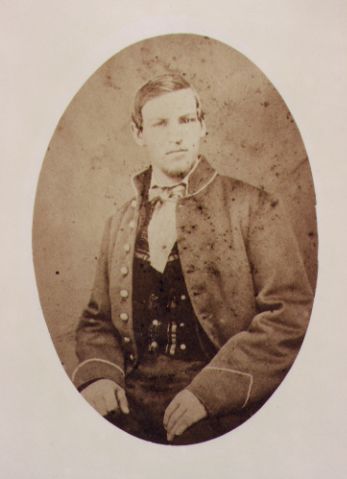

Charles Frederic Allyn was born in Detroit Michigan on March 4, 1844. He was the son of Frederic Allyn (1809-1883) and Ann Morris (1821-1897). Not much is know about his childhood years, although at some point his parents divorced. His mother remarried a "Captain Wilson".
He enlisted in the 2nd Michigan Infantry (date of enlistment not known). While serving with the 2nd Michigan Charles participated in McClellan's Peninsular Campaign, fighting at the battle of Yorktown. He was captured at the battle of Williamsburg and was taken to Richmond as a prisoner. He was quickly paroled and returned to Detroit. He was probably formally "exchanged" for a confederate prisoner, although family tradition has it that his enlistment in the 24th Michigan violated his parole.
He again volunteered for service, this time with company G of the 24th Michigan, on August 12, 1862, aged 18. Two of his step brothers also enlisted in company G : Charles A. Wilson and George W. Wilson. During his service the 24th Michigan, Charles participated in 9 more battles and skirmishes.
The Regiment was heavily engaged in the fighting during the first day at Gettysburg, July 1, 1863. Charles received 2 wounds on that fateful day. He was struck in the head by a "spent ball", and was also wounded in the right side. He was eventually taken to the field hospital that had been set up in the Lutheran Seminary.
By March 1864 he was sufficiently recovered that he was able to rejoin the Regiment in the field. He fought during Grant's Overland Campaign at the battles of the Wilderness, Spottsylvania Courthouse, and the North Anna river. On June 3, 1864 he was again wounded during the fighting at Cold Harbor (Bethesda Church). This wound was much more severe, and shattered his right elbow joint, and then traveled on and lodged in his right side. In order to save the limb, surgeons removed "4 inches of bone" from the joint area.
Charles Frederic Allyn was discharged on May 17, 1865, and returned to Detroit, Michigan. He eventually moved to Comber Ontario (Canada). There, he went into partnership with a man named Arthur Ludlum, a carriage builder. One of Charles' responsibilities was painting the striping on coaches. Family history reports that he had to prop the elbow of his right hand in the crook of his left hand in order to steady the brush.
In 1874 he married Ludlum's sister, Alice Amy Ludlum. The couple had 9 children, one of whom died in infancy.
Since his arm was nearly useless, Charles petitioned the US government for compensation. He was awarded only a lump sum of 18 dollars, equivalent to the cost of an artificial limb. Ironically, if the surgeons had amputated his arm, he would have been entitled to a higher pension. Charles is known to have enjoyed spending time with his old comrades at the GAR hall in downtown Detroit, but may never have formally joined the organization. He is said to have been a heavy drinker in the years after the war; this is understandable, given the nature of his wounds and the persistent pain that he endured.
Charles Frederic Allyn died on June 4, 1893 at the age of 49 years, 3 months. The cause of death was determined to be an aneurysm or brain tumor. The family believed that this was caused by the spent ball at Gettysburg 30 years before. Charles now rests in St. George's Churchyard, Comber, Ontario.
After Charles' death, Alice raised her family in Comber. About
1900, however, she moved to Detroit. She received a small pension
as the widow of a veteran beginning in 1895. She died in Detroit
on December 24th, 1935
Most of the information on this page was previously published
by David Allyn pvtcfa24mi@aol.com
in The Twenty-Fourth Telegraph . David is directly descended
from Charles through Charles' fourth son George Albert Allyn.